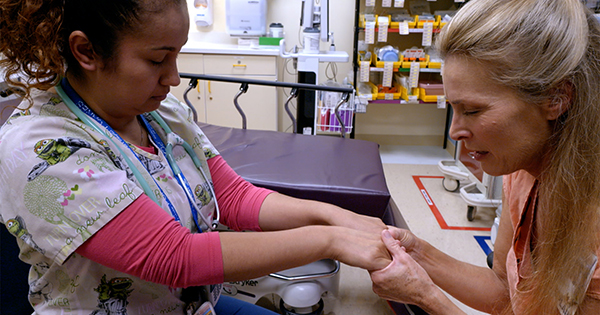Hospitalized with a serious illness a 55-year-old lawyer found himself taking stock.
He’d gone to Ivy League schools, supported a beautiful family, run a prosperous business, bought a second home on the coast. But what had he contributed? What had been the point of it all?
Lying alone in the stillness of the wee hours he remembered what he had really wanted to do was become a teacher.
“So what do you do with that, when you realize a life has been spent in a way that wasn’t the best?” asked Jim Rawlings, who retired recently as head of Duke University Hospital’s pastoral services staff.
“Most people live in such denial that anything can happen to them. It’s one of the times they confront their mortality. And there’s anxiety often,” said Rawlings, who spent more than 30 years as a hospital chaplain.
A common perception of clergy who work in hospitals is that they are there to perform last rites for the terminally ill or prompt 11th-hour conversions. But chaplaincy has little do to with religion per se.
“We try to hear their story,” said Rawlings. “To be able to tell your story is a way to become known and thus become less lonely.”
With American society becoming increasingly disconnected and less religious the chaplain’s role has become particularly important.
‘Improving patients’
A 2013 study by Harvard researchers illustrated patients whose spiritual needs have been met have chosen less aggressive care. A 2015 Mount Sinai paper showed that chaplain visits boost patient satisfaction.
“I see a very clear movement toward chaplains being involved in improving patient outcomes,” particularly in cases of life-threatening illness, said Torrie Fields, senior manager for advanced illness and palliative care at Blue Shield of California. “I think they’re able to see the big picture.”
Society needs that, said Trace Haythorn, executive director of ACPE, the main organization for accrediting spiritual care advisers and education programs.
“So much of our public discourse is oppositional rather than listening deeply for the core of who you are as a person,” Haythorn said. “The very best chaplains help people go to those deep places where very little in this culture is allowed to go safely. The biggest and most important questions in life are often asked in moments like that.” (RNS)
How to pray:
- Pray for strength and wisdom for chaplains across the country as they minister to the patients and employees of hospitals.
- Pray those who Christian hospital chaplains come into contact with will be open and receptive to the gospel. (TAB)






Share with others: